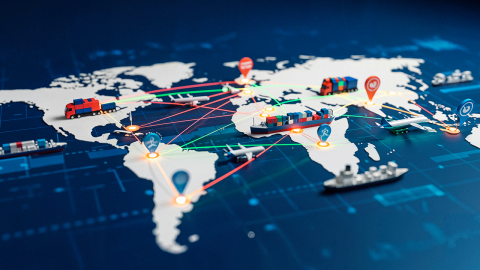On the inaugural day of Amazon Smbhav 2022, Manish Tiwary, Vice President, Amazon India, spoke to Karan Adani, CEO of Adani Ports & SEZs, who Manish said represents, "a young dynamic India that values innovation, embraces disruption and is confidently ambitious." Karan is an Economics graduate from Purdue, and he joined Adani Ports, and SEZs in 2009 to gain expertise in core operations at the Mundhra port, the flagship port of Adani ports and SEZs in Gujarat. He aims to augment the company's identity around an integrated business model that includes port operations, logistics and SEZ development- a combination that is rapidly transforming the company into a leading end to end logistics solutions provider.
Excerpts from the chat...
Manish: Thank you very much, Karan, for joining us today. It feels really good and great to be able to chat with one of India's finest next-generation leaders. So let me jump right in with my first question. The Adani group is a fine example of Indian entrepreneurship playing a key role in important sectors like infrastructure. So, the expectations from you as the next generation leader, they're very high. I'm sure you know that. So how do you cope with the pressure of taking forward such a successful legacy?
Karan Adani: So, Manish in a way you're right, that the expectation is quite high. But I think the expectation is high on how do we do things better, how do we do it faster and how do we do it in a way much different from what has been done in the past. That is what keeps us up at night and charges us to make sure that we live up to that expectation. And I think, we embrace disruptive models, and we always challenge that disruptive model. But one of the big things that we've learned, and this is for all the leaders at the Adani group, is that keep your feet on the ground. Don't worry about the challenge. I try to simplify challenges - simplify it as much as possible and just focus on delivery and execution. I think once we get there, whether we fail or whether we succeed, that's not important. The idea is that we keep trying, we keep pushing, and we keep testing the boundaries of what we need to achieve.
Manish Tiwary: That's really inspiring. I like the focus you have behind the execution and not getting too worried about the output or the results. My next question to you is a little more personal. How do the dynamics work between you and your father, Mr Gautam Adani? As in who listens to whom? And how do you lean on each other for ideation as well as decision making?
Karan Adani: I must say that we have very open communication between me and my father. I must appreciate my dad on this front because he's very curious. He's actually more curious than all of us in terms of understanding how the world is moving towards what young minds are thinking. How are they thinking? Why are they thinking what they are thinking?
We have that environment of push and pull. We have the ability to push back and say that this is not the right way of thinking. I think the way it works is a very, constructive dialogue. At the end of the day, we thrash it out on the table, and whatever is the final decision taken by him, we go and implement that. What is important is that he gives us the opportunity - and this is across the group - to openly discuss. If you don't agree with him, allow us that freedom to disagree to give our point of view and also to challenge your point of view.
I think a lot of times he questions as to why we are thinking this way, and a lot of times, he agrees with what we say. Sometimes we agree with what he says, but at end of the day, we just go with the final decision and then get into implementation. Most important is that once we leave the room, we don't go back and say, “You know, I don't agree with this”, “This was not the right decision,” or “I'm not going to implement that”. That's the way we work.
Manish Tiwary: I must tell you that this resonates with one of our Leadership Principles at Amazon. One of them is “Disagree and Commit”, which is exactly what you're saying- debate is healthy, but after that go and focus on the execution. So just following up on that one Karan, what is the one or maybe two pieces of advice from Mr Gautam Adani, that have really helped shape you, and your outlook as a business leader?
Karan Adani: So, I'll say three things which have really helped me. The first one he always tells us is that “you need to be on the ground, you need to have the pulse of the ground-level situation”. And that means that you should know what your truck driver is going through, what your operator is going through, and what your customer is going through on the ground level. You know, when you talk to your customer, you don't need to talk to the CEO, but instead talk to the manager on the ground with the customer- who goes through the pains, day in and day out. That helps you think through better solutions and improve your service delivery. So, one, he says that always be on the ground and sense opportunity from the ground. That's where you get a lot of new insights, new opportunities, as well as new solutions.
Second, he says that when you're approaching a problem, keep it very simple. We have the tendency of bringing in a lot of jargon, making things complicated. He says, try to make things simple, go directly to what the root of the problem is, or the root of what you're trying to solve, rather than getting diverted with too much jargon and complexities.
And the third thing he says which he has told us is that whenever you do something, think of scale. You don't do something where you can't achieve scale, because if you are not thinking scale, you can't influence; if you can't influence; you can't make things better- you will always be a follower of something, somebody else. So, you know, whatever we do, you have to do at scale, you have to think of scale, either at the state level, national level or at a global level. But it has to be at scale, which allows you to influence, the way things are being done, influence the way your policies are being made; influence how you can change the game of the industry. So, I think these are the big three fundamentals that he said to us, and that's what, I take with me every day. It's not easy doing this on an everyday basis, but those are the principles we live by.
Manish Tiwary: I love that! Stay close to the ground, invent, and simplify, and think of scale. So, Karan, as you know, we love technology at Amazon. And one of your recent statements was that the logistics sector wasn't an early adopter of technology and that such tech-based interventions or disruptions can actually make logistics zero cost. Can you elaborate on that a little more? Do you think India is sitting at the cusp of revolutionizing techno logistics through tech interventions?
Karan Adani: So, Manish the way I look at it. I'll just take a little bit of deviation over here, and I'll come back to my point. In the 80s and 90s, everybody used to have a camera and you used to pay for the roll. So, you used to pay for the hardware and the software- which was the roll. And for every roll you had to pay, you used to get 30 clicks. At that point in time, what if somebody told you that the roll- what Kodak used to make- used to be the big, big money spinner for them. And what if that was going to be zero cost in the 80s or 90s, somebody would think you're crazy. I think that's what the digital camera did, right? Fast forward 30 years, today with phones, you don't know how many pictures you take. At that point of time, you used to think about 30 pictures- each picture is going to cost me 10 rupees or 20 rupees. Now, people take thousands of pictures, and it really doesn't matter. It's absolutely free. And I think that's what I personally feel logistics is going to be in 20-30 years.
And the way I looked at it is to think about logistics in terms of what is the biggest cost for us as a logistics player. One is the fuel cost, right? So, fuel costs when you eliminate, which is happening with electric vehicles coming in. You are eliminating your fuel cost and electric vehicle charging with solar panels, where you don't have to pay for sunlight. So, you are actually eliminating your fuel costs. Then the next level of disruption is through autonomous vehicles. Because after fuel, your second biggest cost is your cost of drivers and maintenance which comes with it. So, once you bring in autonomous vehicles or autonomous technology, you're eliminating your driver cost. And with these two costs coming in, then the focus moves to you just using your vehicle or your hardware as much as you want. With the increase in the utilization of your hardware, basically, you're apportionating, and ultimately you will reach a stage where the cost of hardware is going to be negligible- when you apportion it on a very large volume. So, when you think about it today, I’m just taking the example of Amazon to explain- If you guys are doing 1 million parcel deliveries a day. Think about it, that if from the same fleet you can do 10 or 20 million parcel deliveries, and without removing the drivers, removing the fuel cost or the diesel or the petrol that you guys pay, and it's just 100% Electric. Because you remove the human intervention, you are actually making it really efficient. The cost is going to be as good as zero.
And the third level where actually I feel costs will go towards zero is because somebody will come and say I want to monetize on this data. And I don't want to charge for the data, I want the data. I don't want to charge so that people are scared of using the data. And I think that's where telecom had moved. And I'm pretty sure that it's just a matter of time, I don't know whether it's going to be 10 years or 20 years. But I do feel that you will reach at a stage where people will just say, “you know, you want to move your goods from one place to another here take my car or take my truck and I'll do it for you for free."
Manish Tiwary: Wow. This is really inspiring Karan, as you said, you know, we ship out millions of packages and things like fuel inflation are so important right now. So just staying on the technology point Karan, with the advancement of digital technology one of the things which has happened is that big cities and metros are no longer the focal point or the epicenters of growth and innovation. We're also seeing an accelerated shift from physical work to knowledge work. You know, how are you viewing these trends? What role do you see, the smaller tier two and tier three cities playing and you know, powering India's economic progress?
Karan Adani: So, Manish the way I see it, and especially, I would say two things have happened with COVID. One is access to knowledge - so whether you are you're in Nagpur, or Pune or Bombay, the kids are getting the same access, and this has basically removed that divide, which was there between tier one, tier two, and tier three cities- when it comes to access to knowledge. Also work from home, and everybody having to rework their business model, has happened purely because of COVID.
What I personally feel is that the power of India is actually in rural India and tier two or tier three cities. And I think the kind of ambition, the kind of thinking, and the kind of solution orientation, and the kind of firepower, I would say, the fire in the belly, if I may, the entrepreneurship that you will find in these kids and in these city's it's unbelievable. And I think if we were to power MSMEs, I don't think you can do it in tier-one cities, and that power is only going to come from here. I do believe that end of the day for India to grow, a large part of its growth has to come from MSMEs and SMEs. If they are not becoming more powerful, if they are not growing, India cannot grow. With technology, access to information, access to markets- the divides to access to knowledge has completely been removed. Everybody, whether it's a farmer, a young entrepreneur, or an MSME has access to knowledge now.
I think what is very important as a country is to move towards and to be able to harness and improve infrastructure in tier two and tier three cities. And when I say infrastructure, I don't mean physical infrastructure, I also mean technology infrastructure. So how do we make sure that each house, each village, has fast internet available, each one has a connected 4G network or even 5G. To make sure that there is proper storage of whatever they're doing. Physical storage to make sure that there is enough logistics movement happening. So, I think, if you ask me, that is the next stage of focus that the country needs to do to make sure that we tap into that firepower that the country inherently has. And that's my view. And that's where groups like us, companies like us, corporates, like you guys, also, we need to focus more, we need to give more opportunity over there. And once those markets are developed, I'm sure the flow of goods and the flow of opportunity will happen.
Manish Tiwary: No, you're right, Karan, I think it's truly inspiring. I like the phrase, the firepower in tier two and tier three. A lot of us have encountered the hunger in the belly to do better. Yeah, I completely agree with that. So Karan, before I let you go, I have to ask you this question on behalf of so many young leaders, and entrepreneurs of the next generation who are out there. What would be your advice to them? As you know, this set of entrepreneurs will play a very, very important and key role in shaping the future of India.
Karan Adani: I think India is at a great tipping point of next growth. And I think that growth is going to be exponential. I think the opportunity that the country will provide us will be unlike anywhere else in the world. My simple advice for fellow colleagues as well as entrepreneurs would be- we need to do better than what our earlier generations did. I don't think we should shy away from accepting or adopting new ways of working, or new ways of technology.
One of the big things going on globally is climate change. So, adopting new clean energy, because I do believe that end of the day, the next trillion-dollar companies are going to come from people who are going to ride the wave of climate change and technology change. And either you can be with it or be against it. I think if you're against it, there’s only so far, we can go. But if you're going to be with it, I think India is at the cusp of creating those trillion-dollar companies.
It's funny you asked me, but the way I look at it is there is full karma happening. Earlier people used to call India ”Sone ki Chidiya”, right? It used to be controlling 1/4 of the world's GDP, and I think we are getting there again. I think people, entrepreneurs, as well as young people, unless they are part of this mission, India cannot reach that goal. And I think we just need to believe in India, we have to believe that we can reach there. And, you know, with younger talent, I'm sure we will reach there.










